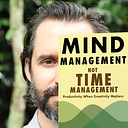Don’t let past success prevent future growth
When we experience success, we can easily lock ourselves away from future growth. There is pressure for everything that follows a success to not only be successful, but to be even more successful.
But giving into that pressure is a recipe for disappointment. It also takes away the spirit of what made our work good in the first place.
I experienced rapid success when my first book debuted in the top 20 on Amazon. My life changed overnight. The years I had spent searching for just what it was that I had to offer to the world were suddenly validated.
That success gave me the opportunity to travel the world. I spoke dozens of times in eight countries. I built a business, and became location-independent.
But when I got the itch to create again, I hit a wall. It’s been seven years since I wrote that book, and I’m only now finally writing a new one.
Here’s how past successes hold us back from future growth:
- Success tells us what we “should” do: When we’re successful, opportunities open up. So many opportunities, we don’t know which ones to pursue. Those opportunities can be crippling, because we feel guilty for not pursuing what we “should” do: the things that will bring us the most money.
- Success makes us scared to let others down: When we make something that others like, we’re afraid to let those same people down when we make something new.
- Success makes us lose sight of how we became successful: If you’ve made something fresh and original, you didn’t get there by doing what you “should” do. Chances are, you had nothing to lose, and that drove you. Well, now you do have something to lose.
The “shoulds,” the fear of letting others down, and losing track of the “how” all work together in a cycle. If we’re not careful, we’ll never make something successful again. Worse yet, we’ll lose the love for our work.
This is what makes bands have “the sophomore slump.” It’s what makes sequels of hit movies lose that something special. It’s what leaves established companies vulnerable to an overnight takedown by a nimble startup.
I’ve been held back in writing my next book, because of the success of my previous book. I’m only now learning how to overcome the limitations of my previous success.
Here’s what I’m learning about overcoming success:
- Aim for growth, instead of success: You have no control over whether what you make next will be successful. You do have control over whether or not it’s a growing experience. Focus on growth instead of success.
- Throw it all away: You don’t have to burn what you’ve created, but you can give yourself permission to let go. When Steve Jobs was fired from Apple, as painful as that was for him, it’s what gave him “the lightness of being a beginner again.” He went on to found NeXT Computer, and Pixar, before being reunited with Apple.
- Be skeptical of praise: Don’t go looking for praise from those who know your work. Instead, start somewhere new. Bob Dylan always knew he’d alienate fans when he reinvented himself. Steve Martin broke ticket sale records as a stand-up comedian, but quit to make movies.
Sometimes, it’s just a matter of making it fun again. When Louis CK purposely did no promotion of Horace & Pete, and announced it at 10am on a Saturday morning because “that’s the dark side of the moon on the Internet.” This can even look like self-sabotage, such as my own proclamation that my next book won’t be a NYT best-seller.
Think about the successes in your life and career. Are you doing what you “should” do? Are you afraid to let others down? Do you feel like you have too much to lose? You have to let go of it all if you want to reconnect with a love for your work, and go back to the spirit of what made you successful in the first place.
I’m giving away my new book, Getting Art Done. But you have to sign up by Friday »
